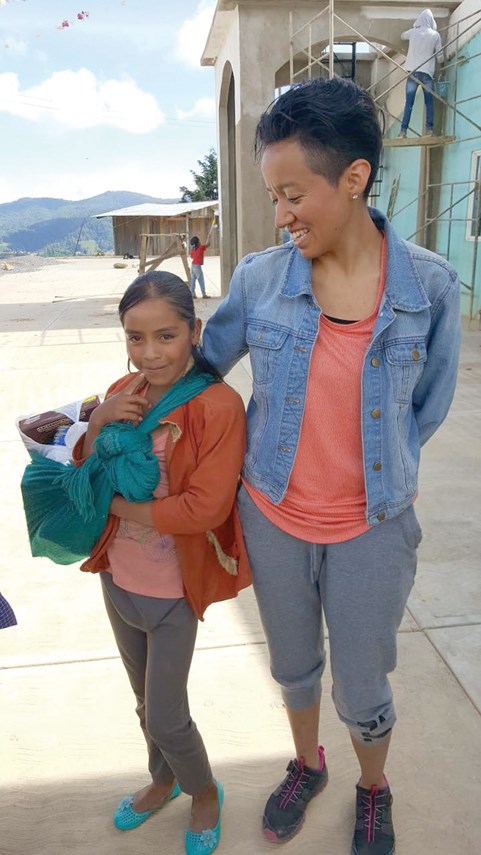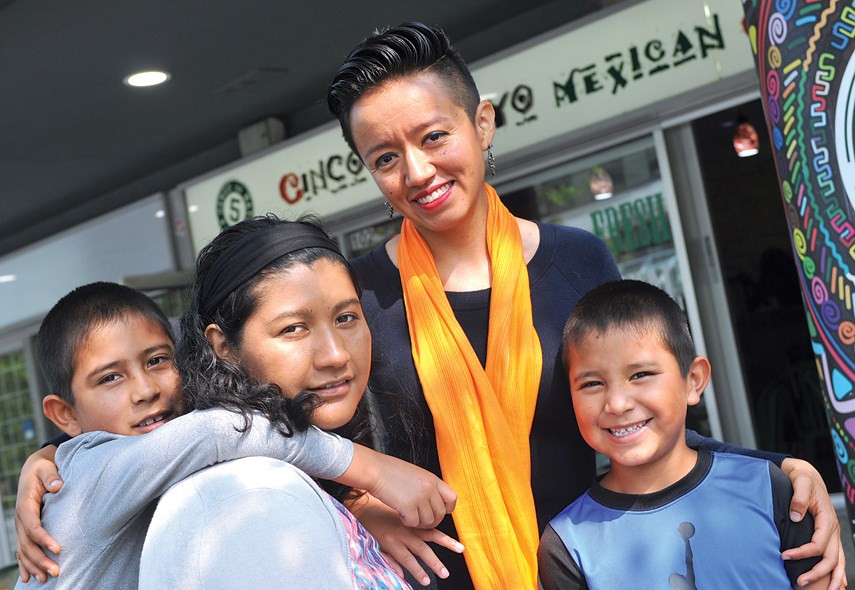It starts with one student in Mexico and snowballs from there.
Education is the engine, powerful enough to reverse the cycle of poverty. But without fuel, life stays in neutral.
Six months ago, on the eve of her 30th birthday, Zaira Flores wanted to make a change in her life. She had a gut feeling that something was missing.
“I am very thankful for my business but it doesn’t fulfil me. And I always grew up believing in giving back,” explains, Flores, co-owner of Cinco de Mayo Mexican Grill in Lower Lonsdale.
There had been a fateful meeting in her restaurant a few years earlier. Victoria Esteban had wandered in and her story of how she arrived at this point made an impact on Flores.
Esteban’s journey started in Los Reyes De Ocampo Tepeaca, a small town in the state of Puebla, Mexico, where optimism was as scarce as food for the children. In Esteban’s family there were nine empty stomachs to feed.
Esteban made it to her first year of elementary school before being put to work on a farm alongside her parents. She would pick tomatoes, cilantro and lettuce, sometimes eight, nine hours a day under the blazing sun.
One day when Esteban was eight she woke up and summoned some precocious courage. She pulled on her best outfit and begged her cousins to drive her to Mexico City.
Esteban’s eyes widened with wonder and possibility as they entered the metropolis.
Her cousins dropped Esteban off in the middle of a wealthy Mexico City neighbourhood and left the child to fend for herself.
The young girl walked the unfamiliar streets and knocked on strangers’ doors, asking if she could have a job. Eventually, a well-to-do family invited Esteban into their home to do cooking and cleaning.
While it was hard to be separated from her own family, Esteban felt comfortable for the first time in her life.
“I was very happy because there was food and a nice bed,” she recalls.
Throughout her childhood, Esteban continued to work as a housekeeper – making the equivalent of C$20 a week. Her sending money back home enabled two of her siblings to go to school, one of whom now works as a chef in Mexico City.
Ten years ago Esteban took another leap forward by moving to Canada. She worked as a nanny when she first arrived in Vancouver, but now operates a cleaning business with two employees.
Flores knows Esteban is an anomaly.
“This person never had the opportunity to go to school and learn how to write or read,” says Flores.
In July, Flores made the decision to visit Esteban’s town and help set its younger inhabitants on a different trajectory.
She saw the struggles firsthand. Flores met Juan Carlos, 8, and his younger sister, who both suffer from a painful condition called epidermolysis bullosa that causes the top layer of their skin to blister and break from the slightest touch.
The siblings sleep roughly on the floor, while their condition worsens because medication is cost prohibitive for the family.
In parts of Puebla, Flores observed education roadblocks.
Families don’t have money for school supplies. When kids do go to school sometimes it’s in a makeshift classroom in poor conditions. But once they become teenagers they are starved of learning because there’s no high school.

Flores didn’t have to go to Puebla to know about poverty. Growing up in Michoacán, Mexico, Flores could have inherited that hardship; instead her descendants broke the cycle through education.
“My mom’s family was really, really poor and my grandma was only able to send two (children) to school – one of them was my mom,” explains Flores.
“That made an impact on my mom’s life because she didn’t have kids when she was 16, she had children when she was 23.”
If she was still living in Mexico, Flores says there would have been pressure for her to start a family at a young age, as opposed to an emphasis on education.
“I believe not only in (woman) having children … but also fulfilling their dreams,” she says.
Flores made her way to Canada by herself as an 18-year-old to study English. Less than a decade later she became a business owner.
Through Cinco de Mayo, Flores is paying it forward. She has sponsored a scholarship foundation, Vamos a la Escuela, which translates into “Let’s go to school” in Spanish.
The beneficiaries will be less fortunate children in rural Mexico who struggle with educational opportunities.
“We will be helping them realize that they really can reach their dreams, career goals and help break the cycle of poverty,” says Flores.
Already Flores has helped fund one round of medication to treat Juan Carlos and his sister’s skin condition. Plus she has brought in two psychologists, including Flores’s mom, and a Canadian teacher who are working with children in the town.
Back in Canada, Flores says many of us here have the tools to collectively crack the cycle of extreme poverty that exists in other nations.
“Someone has to take the first step and everything falls in place,” she says.
Flores has organized a charity evening to launch the Vamos a la Escuela Foundation on Aug. 30 at The Pipe Shop at Shipbuilders’ Square.
The event will feature live music, food from Cinco de Mayo, margaritas, a silent auction, and a viewing of the documentary filmed while Flores was in Puebla.
Tickets are $30 and available here.



